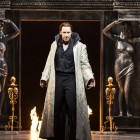Don Giovanni 2013Scottish Opera
Read more about the opera Don Giovanni
Sir Thomas Allen was one of the greatest interpreters of the title role in recent years, and has not always been entirely complimentary about the directors who were in charge of the various stagings he graced around the world. His overall view of this hugely challenging masterpiece was therefore fascinating in prospect. And Scottish Opera badly needed a good Don Giovanni - it was nearly twenty years since they had an adequate one, over thirty since they had a really fine production. It is thus cheering to find that, for the most part, this staging is largely successful.
The setting was the fascinating city of Venice in the baroque period: dark, dank, and sinister, with Donna Elvira arriving by gondola, and a canal across the front of the stage. Elements of the set moved on and off easily, and most of the time the playing area was restricted, almost claustrophobic. It only opened out for the two act finales. There were some novel touches - the Commendatore was apparently stabbed by Leporello. The graveyard scene, in which the builders are still putting the Commendatore's memorial together, most certainly worked - scaffolding, canvas, a ladder - apart from anything else, it provided a structure for the singer to lean against. Another novelty was the use of a screen of fire to shield Giovanni's escape at the interval. This of course prefigured the return of the flames at the end, from which there was no escape.
Most of the characterizations worked well. Masetto much of the time was easily roused and potentially violent, but then very protective of Zerlina when required. Ottavio is rather a dull individual ready to fetch the authorities, far less willing to take action himself. Anna was, in the second half, at least, shadowed by a couple of nuns, to show that she really might take the veil. They ignore Elvira, who, in the end, does just that. The three women were all strongly drawn, and Zerlina's reconciliation with Masetto during 'Vedrai, carino' really was quite moving. Giovanni and Leporello themselves are very much a pair of rounded believable characters, for which we may be grateful. Giovanni is rarely seen to be so consistently cheerful, with a broad grin lighting up the stage. But then the famous drinking song was unusually restrained (very welcome).
The title-role was taken by young South African baritone Jacques Imbrailo, whose Billy Budd at Glyndebourne was deservedly highly praised (and by fortunate timing was televised on BBC-4 during the Edinburgh run). He was also on the Jette Parker scheme at Covent Garden, singing several major roles. The praise seems justified - this was an absolutely confident and accomplished first attempt at the role. The Hungarian baritone Péter Kálmán, also appearing here for the first time, made a stalwart Leporello. Beautifully sung and sharply acted, perhaps taller than usual, quickly revealing his own roving eye, and thus sparking the idea of blaming him for the attack on Zerlina.
Lisa Milne made a welcome return as Elvira, some eighteen years after her memorable Zerlina in John Cax's staging (a production that was by no means perfect, but contained many excellent things). There was none of the suggestion common in other stagings of near-hysteria or even pregnancy. Just a deeply-wounded lady who, despite her best efforts, still loves the rake. Anita Watson joined the company for the first time as Anna. She was a late replacement for Susan Gritton on opening night, and ended up singing the entire run. This was a strong performance dramatically, making the character more than usually believable. and in general confidently sung - only the definition of her coloratura was occasionally less than perfect.
Ed Lyon sang his two arias quite beautifully, including decorations. It seemed all the more surprising then that (at least on 19 October) his vocalisation of the dramatically vital recitatives was a bit lacking in dramatic power. It was a decidedly middle-aged characterization, given the youth and natural liveliness of the singer - after all, Ottavio can bear several different readings. Anna Devin was able to do more with the character than she had earlier this year as Sophie in Werther. Not only was she able to manipulate Masetto at will and show a degree of willingness when Giovanni approached. But, much affected by his singing of 'Il mio tesoro' she even looked as though she was considering Ottavio as a possible challenge. She sang both her arias most attractively. Barnaby Rea and Jóhann Smári Saevarsson also made valuable contributions.
The evening's conductor, Speranza Scappucci, was a completely unknown quantity in Scotland before these performances. She led a thoroughly enjoyable account of the score, drawing an excellent performance from the orchestra in true chamber music style. None of the speeds were rushed, but everything flowed naturally, with lots of bubbly woodwind.
Performance Cast
- Leporello Giovanni's servant
- Donna Anna the Commendatore's daughter
- Don Giovanni a young nobleman
- Commendatore an elderly aristocrat
- Don Ottavio engaged to Anna
- Donna Elvira a lady from Burgos
- Zerlina a peasant girl
-
Anna Devin (Oct 15, 18, 20, 24; Nov 7, 17, 19, 23)
Ruth Jenkins-Róbertsson (Oct 22, 26, 31; Nov 2, 9, 14, 21)
- Masetto a peasant, engaged to Zerlina
Performance DatesDon Giovanni 2013
Theatre Royal, Glasgow | Glasgow
15 Oct, 19.15 18 Oct, 19.15 20 Oct, 16.00 22 Oct, 19.15 24 Oct, 19.15 26 Oct, 19.15
His Majesty's Theatre, Aberdeen | Aberdeen
31 Oct, 19.30 2 Nov, 19.30
Eden Court Theatre | Inverness
7 Nov, 19.15 9 Nov, 19.15
Festival Theatre, Edinburgh | Edinburgh
14 Nov, 19.15 17 Nov, 16.00 19 Nov, 19.15 21 Nov, 19.15 23 Nov, 19.15






